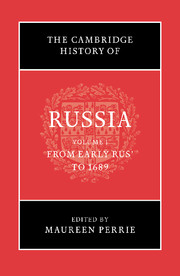Book contents
- Frontmatter
- 1 Introduction
- 2 Russia’s geographical environment
- Part I Early Rus’ and the Rise of Muscovy (c. 900–1462)
- 3 The origins of Rus’ (c.900–1015)
- 4 Kievan Rus’ (1015–1125)
- 5 The Rus’ principalities (1125–1246)
- 6 North-eastern Russia and the Golden Horde (1246–1359)
- 7 The emergence of Moscow (1359–1462)
- 8 Medieval Novgorod
- Part II The Expansion, Consolidation and Crisis of Muscovy (1462–1613)
- Part III Russia Under the First Romanovs (1613–1689)
- Bibliography
- Index
- Plate section"
- Plate section"
- References
3 - The origins of Rus’ (c.900–1015)
from Part I - Early Rus’ and the Rise of Muscovy (c. 900–1462)
Published online by Cambridge University Press: 28 March 2008
- Frontmatter
- 1 Introduction
- 2 Russia’s geographical environment
- Part I Early Rus’ and the Rise of Muscovy (c. 900–1462)
- 3 The origins of Rus’ (c.900–1015)
- 4 Kievan Rus’ (1015–1125)
- 5 The Rus’ principalities (1125–1246)
- 6 North-eastern Russia and the Golden Horde (1246–1359)
- 7 The emergence of Moscow (1359–1462)
- 8 Medieval Novgorod
- Part II The Expansion, Consolidation and Crisis of Muscovy (1462–1613)
- Part III Russia Under the First Romanovs (1613–1689)
- Bibliography
- Index
- Plate section"
- Plate section"
- References
Summary
The Rus’ Primary Chronicle’s quest for the origins of Rus’
The question of the origins of Rus’, how a ‘land’ of that name came into being and from what, has been asked almost since record-keeping began in the middle Dnieper region. The problem is formulated in virtually these terms at the beginning of the Rus’ Primary Chronicle. The chronicle supposes a political hierarchy to have formed at a stroke, through a covenant between locals and outsiders. The Slavs, Finns and other natives of a land mass criss-crossed by great rivers agreed jointly to call in a ruler from overseas. Turning to ‘the Varangians, to the Rus’’ they said ‘our land is vast and abundant, but there is no order in it. Come and reign as princes and have authority over us!’ The response, in the form of the arrival of three princely brothers with ‘their kin’ and ‘all the Rus’’, is dated to around 862. The younger brothers soon died and the survivor, Riurik, joined their possessions to his own and assigned his men to the various ‘towns’ (grady). There were already ‘aboriginal inhabitants’ in them, ‘in Novgorod, the Slovenes; in Polotsk, the Krivichi; in Beloozero, the Ves… And Riurik ruled over them all.’ Before long a move was made southwards to the middle Dnieper by non-princely ‘Varangians’, Askold and Dir. They are said to have come upon a small town called Kiev and took charge, having learnt that the inhabitants paid tribute to the Khazars. Later a certain Oleg arrived, not, apparently, a prince himself, but acting on behalf of Riurik’s infant son, Igor’.
Keywords
- Type
- Chapter
- Information
- The Cambridge History of Russia , pp. 45 - 72Publisher: Cambridge University PressPrint publication year: 2006
References
- 1
- Cited by

